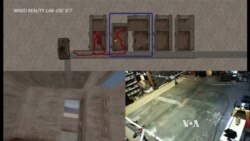The military uses virtual reality to enhance its training. But there is one hurdle to overcome before the experience can be truly immersive: how to fool the senses in a virtual world. The Mixed Reality Lab - a part of the University of Southern California Institute for Creative Technologies - is exploring this problem for the Army in a project called “Redirected Walking.”
Virtual reality is no longer science fiction, but a real tool for the military.
“Virtual reality is very commonly used for training soldiers and giving them the level of knowledge and preparedness that they need before they are deployed," said Evan Suma.
Evan Suma at the University of Southern California Institute for Creative Technologies says there is one fundamental limitation to this technology.
“How do we walk around if we are standing in a room that is limited," he asked.
Suma says current virtual reality experiences limit the movements of the user. He is working on a project called “Redirected Walking” to change that. The aim is to trick the users' senses into thinking that they are walking in an infinite virtual world, when in reality they are just walking within a limited space.
Suma says developing this software means replicating experiments done in the field of psychology. One of those is how a person’s sense of vision dominates over many other senses.
“If I rotate the world slowly around your head while you are in virtual reality, as long as it’s small enough, you will actually believe what you are seeing more than what you are feeling, and I can use that to actually get you to curve and walk in a circle while perceiving that you are walking straight. So that is something that came straight out of psychology," he said.
In addition to training soldiers for combat, virtual reality with a redirected walking component can also help those in the military who suffer from post-traumatic stress disorder.
“When you can move around and really walk around a virtual environment, your sense of presence - that is your feeling of being a part of the virtual world - the power of the experience is greater," said Suma.
This experience can also be translated to consumers and be applied to different types of video games says Vlad Bahur.
“Something like this would be amazing," said Bahur.
Wearing a head-mounted display that allows him to see and explore a virtual world of doors and rooms and hallways, Bahur experienced redirected walking during a Mixed Reality Lab open house. He says this can bring gaming to a new level.
“All kinds of games - exploration games, first person games, action games, even sport games," he said.
Companies and universities are working on technology in which mobile devices, such as smartphones, can eventually track a person’s movements to replace a complicated motion-capture system of mounted cameras currently used to make redirected walking work.
Evan Suma says once advanced hardware becomes available, redirected walking software can be integrated for a more realistic, portable and inexpensive experience for both the consumer and those who are training for combat.









